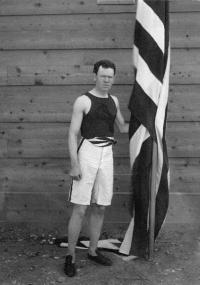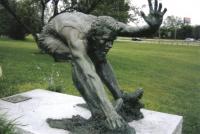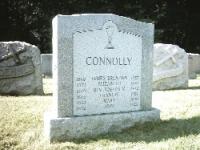Film eye: An Chead Laoch: James Brendan Connolly
Published in 18th–19th - Century History, Issue 4 (July/August 2012), Reviews, Volume 20
James Brendan Connolly beside an American flag at the 1896 Athens games. (IOC Lausanne)
Baron Pierre de Coubertin’s dream of reinventing the ancient Olympian tradition was realised in 1896, when the first modern Olympics were held in Athens. The first medal of the games was won by the Irishman John Pius Boland for tennis, while the first medal won in track and field, and the subject of Bob Quinn’s film, was in the hop, skip and jump (or triple jump) and was taken by a young Irish-American, James Brendan Connolly. Quinn’s film, which features Seosamh Ó Cuaig as narrator, works its way across the landscape of Connolly’s life, from the statue celebrating his achievement in Joe Moakley Park in South Boston to the fishing port of Gloucester, Massachusetts, where he found fame as a writer. The documentary is fascinating for uncovering the life of a man who should be well known but is now largely forgotten. It begins with Ó Cuaig visiting Connolly’s statue. There Connolly begins talking to Ó Cuaig. Connolly’s accent is pure South Boston but, this being a TG4 documentary, he delivers his lines in perfect Irish. Once Connolly has met Ó Cuaig, he leads him through his life and the places that were important to him. The documentary has the look of a road trip taken through Connolly’s life, but with the addition of archival photographs and contemporary film An Chead Laoch works as an important historical account of a little-remembered figure.As the documentary charts, Connolly was born in South Boston to parents who had emigrated there from Inis Mór. His father worked on the Boston docks, and seafaring would be a constant theme in his life. After leaving school, Connolly moved to Savannah, where he worked in the engineering corps of the Marines before returning to Boston and enrolling at Harvard. By his own admission Connolly was a poor student and it was athletics that consumed his time, as he amassed a number of national and state titles in the triple jump.

The statue celebrating Connolly’s achievement in Joe Moakley Park, South Boston. (Lily and Michael O’Donovan)
The 1895 announcement that de Coubertin was planning to reinvent the Olympics in Athens captivated Connolly, but to compete he had to resign his place at Harvard. Connolly was an anomaly in the United States team. He was the only member representing his local athletics club (Suffolk); the remainder were drawn from the élite Boston Athletic Association. Connolly, from South Boston, was different: while he was a champion who’d earned his place, he was working-class and had his roots in an Irish immigrant neighbourhood. He paid for his own passage to Greece, and after the games had finished he had to work his passage back across the Atlantic on a cattle ship.Unfortunately Connolly sustained an injury prior to departure for Greece, and he spent the Atlantic crossing resting. Upon arrival in Athens, and owing to a miscommunication over dates (the Greeks still used the old Julian calendar), he discovered that, rather than having time to recover from his journey, he was set to compete in his first event, the hop, skip and jump, less than 24 hours after his arrival in Greece. Despite the lack of acclimatisation, Connolly’s leap of 44ft 11in. was enough to secure victory, and he entered the record books as the first winner of an Olympic medal in track and field for over 2,000 years. He also took a silver medal in the high jump and a bronze in the long jump. At the 1900 Paris Olympics he came close to defending his hop, skip and jump title but had to settle for silver.

Connolly’s headstone—the film closes with an image of it but does not dwell on his slow slide into relative pennilessness and obscurity. (Cinegael)
For many an Olympic medallist since 1896, winning at the games was likely to have represented the summit of their life’s achievement. For Connolly it was only the beginning. As An Chead Laoch shows, Connolly’s real fame, certainly in the American context, came as a writer. Shortly after his return to Boston, Connolly volunteered to fight in the American–Spanish War. The letters he sent home to his brother, recounting his experiences in Cuba, were passed to and printed by the Boston newspapers. On his return from the war, Connolly was regularly employed to write about sporting matters, but also a series of short stories based on his experiences of seafaring. Writing articles and books, Connolly honed his craft and became renowned for his tales of the sea. He relocated to Gloucester, Massachusetts, and began sailing on every type of vessel that put to sea. He was even granted permission to serve in the US Navy, under an assumed name, by President Roosevelt. Indeed, such was Roosevelt’s admiration for Connolly that he stated that if he had to choose a role model for his son he would choose the man from South Boston. The close ties between the two men also led Connolly to enter politics, standing in Boston on the losing Progressive ticket in 1912.In 1921 Connolly journeyed to Ireland. Officially he was acting as an agent of the American Committee for Relief in Ireland (to ascertain whether, as the British claimed, committee monies were being used to buy IRA arms), but he also took the time to file weekly reports in several American newspapers, detailing the state of affairs during the war. Connolly continued with his book- and article-writing right through to the 1940s, and died in a veteran’s hospital in Boston in 1957. He had begun to slip into obscurity from the mid-1930s, and struggled to make an income from writing.An Chead Laoch, while closing with an image of Connolly’s headstone, does not dwell on his slow slide into relative pennilessness and obscurity. It serves an important function in reminding the viewer of this largely forgotten man, this Olympic pioneer, but it does little to reveal the complexities of the man himself, of his social standing and of his Irish heritage. As a documentary An Chead Laoch works, as it allows a good story to be told and highlights the pioneering nature of the 1896 Olympians, but much more remains to be said about Connolly and the times in which he lived. HI
Mike Cronin is the Academic Director of Boston College in Ireland.
















